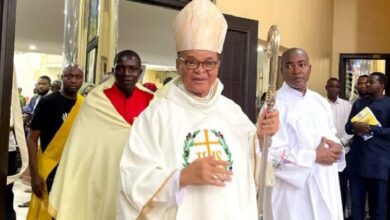Catholic Nun advocates for women recognition
By Damian Avevor
Rev. Sr. Margaret Mavis Ankamah, SMMC, Co-ordinator of Gender and Development at the Ho Diocesan Development Office, says that the Church has a duty to contribute to the recognition and liberation of women, following the example of Christ’s own esteem for them.
0She said that giving women opportunities to make their voices heard and to express their talents through initiatives which reinforce their worth, their self-esteem and their uniqueness, would enable them to occupy a place in society equal to that of men.
She called on the Church in Ghana to encourage and promote the formation of women so that they could assume their proper share of responsibility and participation in the community life of society and of the Church.
In an interview with The Catholic Standard at Ho, during the celebration of this year’s World Women’s Day, Sr. Ankamah told women that they should build up their self-esteem and be proud of themselves, since they had an important role to play in society to enhance the growth and development of the Church and the nation as a whole.
Advocating for support for women to play important roles in the Church, she said women have all it takes to contribute effectively to the humanization of society, noting that they formed the nucleus of society; beginning from the home.
She said when given the opportunity, many more women could equally deliver like other women who have taken up the challenge and are making significant sway or impact in the Church and society.
Sr. Ankamah said the Catholic Church in the past did a lot develop women and is continuing to empower them in the various fields of their endeavours, lamenting that most of the leadership positions being held by the laity in the Church and the country were male-dominated.
She, therefore, appealed to women to prepare and avail themselves of opportunities for Church and public leadership, stating further that the Government and other stakeholders should develop policies to reverse the trend through affirmative actions and by paying attention to strategic gender needs of women.
“When women are given the chance, they could play effective roles in national development just like their male counterparts, and even more. Women have more potential of developing themselves to contribute to the development of the Church and nation.”
To affirm her point with Holy Scriptures, she said, there were scriptural examples which clearly show strong, competent and God-fearing women fulfilling important roles just as men do.
Giving two examples in the Bible, she cited in the Old Testament, the role of Debora when she served as a judge in Israel (Judges 4 and 5). Thus, we find in Judges 4:4-5 that the children of Israel – not just the women, came to Debora for judgment (counsel).
In the New Testament, Priscilla worked together with her husband, Aquilla, in several ways, including taking the role of teaching the Scriptures to individuals (Acts 18:26), she added.
She said gender equality is both a goal in itself and a pre-requisite for achieving the Sustainable Development Goals, noting that empowered women could bring new ideas and perspectives to decision-making and increase the chances of education and employment for the next generation.
The Ho Diocesan Gender and Development Co-ordinator said the women’s rights and empowerment and girl-child education were the priorities of her Office, recalling that the sensitization on girl-child education in 30 communities formed part of one of the five major areas under the six-year project of the Diocese entitled: Enhancing Human Resource for Growth and Development at Community Level.
In addition, a five-day teaching and learning session in Mathematics, English Language, Integrated Science and Social Studies was also held at the Mater Ecclesiae School at Sokode-Gbogame for 210 girls of selected basic schools in the Ho Diocese in 2015.
She called for strategic ways of developing programmes for women for their spiritual, economic, social and physical growth.
On the forthcoming elections in November, Sr. Ankamah advised women to guard against electoral violence and malpractices since women were the bedrock of society, calling on them to discourage their husbands, brothers and children from similar acts.
She indicated that provocative words inflamed hearts and generate into violence, and appealed to all Ghanaians, especially her fellow women, to be charitable in their speeches.
She noted that when there is violence in a country, women and children suffer most, urging women to crusade against violence and to pray for a peaceful and violent-free election before, during and after the 2016 elections.
She advocated for the organization of peace marches and peace fora for women so that they would put Ghana first in whatever they do.
Sr. Ankamah encouraged Political Parties to ensure that women were exclusively involved in decision-making at the District levels and partake in Inter-Party Advisory activities to build their confidence and ensure that the party structure did not discriminate against women.
She said when women have access to finance, credit, technology and markets, they were more likely to expand their businesses and contribute effectively to the upkeep of the home as well as the growth and development of the nation.
Therefore, investing in women and mobilizing them to participate in the socio- economic development of Ghana `was not only the right thing to do but a good one which would inure to their own benefit and that of the nation as a whole, she added.
